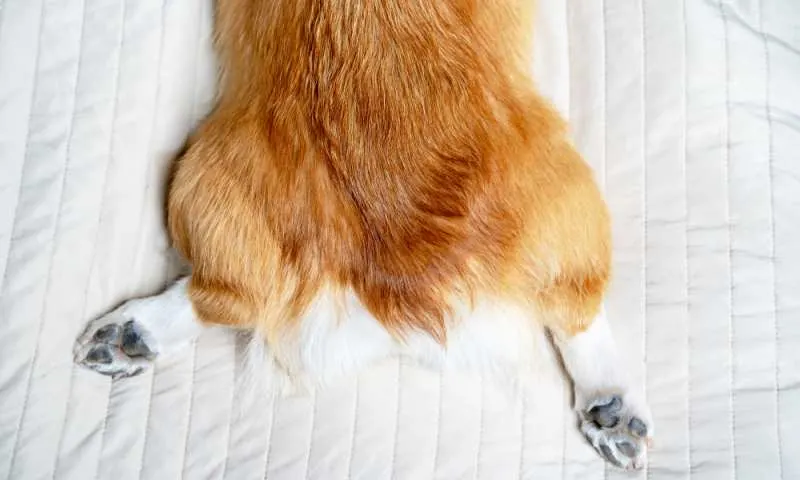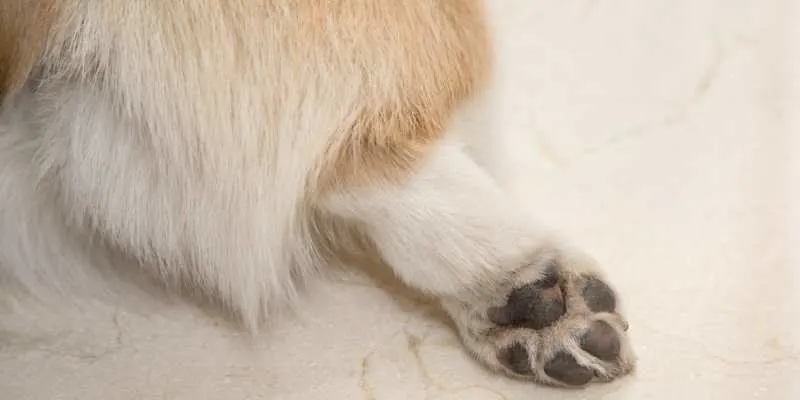You must have seen your corgi in weird positions and wondered where this habit came from – maybe it’s their own habit, or perhaps you taught him to do it. Either way, it’s always interesting to learn something more.
If you’re wondering why do corgis lay with their legs out, I have the answer to that question. And since it’s about your cute pet’s tiny legs, I have a few more things you might be interested in.
So, keep scrolling, and you can learn something interesting that you didn’t know before, but also recap some facts about your corgi pet.

The Body Structure
If you came back from work or just came across your corgi lying with its legs out, you must have wondered – why? Don’t worry, everything is okay with your pet.
Well, the answer is actually obvious and lies in the structure of their bodies. Yes, it’s the small dog syndrome. Your corgi lays with its legs out because his legs are too big for it to adjust differently.
If, in addition to corgis, you have another breed of dog in your household, you have probably noticed that they literally bend their legs before they settle down to lay down. This is the case with Labradors, German Shepards, and other dogs that are of average height.

Neutering Male Corgis
So, either free will or “a corgi thing” is the reason why your corgi lays with your feet out – you should know that there is another one that has a medical background. It’s about dog neutering.
For those unfamiliar with this, neutering is the process by which your corgi has its testicles removed, making it sterilized. This is actually a common endeavor for those owners who do not want an offspring.
Since this is performed by surgery, the life after that (i.e., the lying position) can change. Once again, this is not a reason to panic or be scared, your dog is just getting used to a different and more comfortable position.
When this procedure is done depends mainly on your corgi. Before you sign up for the surgery, you should go and consult your veterinarian. Many factors affect time, and one is definitely the overall health of your dog.
In case you have already bought an adult corgi, the owner may have already done this before you.
Some of the benefits of this are:
- Reduces the chances of prostate infection (which is very common for dogs that have spent most of their lives in dog shelters where hygiene is often neglected)
- Reduces the chances of any potential hormone-related diseases
- Reduces the possibility of testicular cancer (this breed is not the healthiest, so taking up this procedure is often a wise choice)
- Controls roaming behaviors (this can reduces the chances of your corgi impregnating other dogs in your environment)
Also, there is a common belief that neutered dogs live longer than those that have not had this done, but that’s nothing more than a pure speculation currently. Having already mentioned this procedure, it is important to mention the treatment afterward. As for you, you have to be careful and open all four.
And as for your corgi, rest and reduced activity. This is certainly not easy for a dog breed that is used to being out all day, but recovery is paramount. So, no running around the yard, no long exhausting walks, and socializing in the park. Some veterinarians will even recommend that your corgi wear a so-called E-collar to prevent them from licking.

Sleeping On Its Back
Another interesting sight you may come across is that your corgi is sleeping on its back. Unlike the position of the legs, which has just been clarified, this is not so rare. Many dogs can sleep on their backs, but corgis are the current focus – so here are a few possible reasons.
Cooling Down The Body Temperature
If you saw a corgi lying stretched out on its back on the tiles from the threshold of your door and it is currently June, the light bulb above your head should go off.
This is closely related to the stabilization of the body temperature. As you already know, the corgi is a breed that has a thick double coat, and believe me when I say that it is not easy to live with this – neither for the owner nor the dog.
Lying on the floor on its back is a way for your corgi to cool down and rest.
The Feeling Of Safety
If you have had corgi in your house for some time, you probably know how protective these dogs are. Every little thing or unfamiliar sound is like an alarm for them. However, when you see them lying on their backs, know that they feel safe.
It’s a sign that you can feel the same way. After all, isn’t it more comfortable to stretch out on your back?
A Sign Of Submission And Loyalty
Lying on your back doesn’t have to be just a sign that everything is safe in the house. This can also mean that the corgi trusts you and feels safe in your presence.
Roads are situations where purchased adult corgis have a hard time trusting their new owners. This is seen in behavior and even sleep. So when your corgi starts lying on your back, it will be a sign that it is loyal to you and trusts you.
In addition to this, this can also be the effect of the place on which it sleeps. You’ve probably seen a lot of dogs stretch out on their owner’s lazy bag. Sometimes, when they are exhausted, they will do this on the floor or in their dog house. No worries, this is just a corgi thing.

Hip Problems In Corgis
We have already mentioned that corgi dogs are not the healthiest dogs, so the way they sleep and how their little legs move carry much more meaning. One of the not-so-nice facts about corgi dogs and their legs is hip dysplasia. This is, unfortunately, very common for the corgi breed.
Your vet has certainly warned you that this is a great possibility, but let’s briefly remind ourselves what the symptoms are:
- Decreased activity (your corgi will be repulsed by invitations to play)
- Decreased range in movement (generally, it will be harder to move through the house)
- Weight of muscle mass
- Signs of pain
How Exactly To Diagnose This Disease?
Well, this is hard to do without the help of your vet. That is why it is essential that you do not skip your regular vet check-ups. The vet will usually do a detailed physical examination of your corgi and maybe some x-rays. In this way, they will determine if this is really a problem and how to treat it.
Hip dysplasia in corgis is treated in some of the following methods:
- Physical therapy (this would require you to take your dog to therapy session every now and then and perhaps participate in some exercise as well)
- Anti-inflammatory medication (this is prescribed to your corgi if he is in excruciating pain)
- Weight-loss (some veterinarians recommend hernia removal and diet modification)
This problem should not be ignored because it can affect how your corgi will move in the future if not resolved in time. If you are responsible and start treating your dog right away, you can go through with minimal consequences.

Sleeping with their legs out is just one more reason why you should take a corgi dog. So, if you are one step away from adopting or buying this breed, here are a few more reasons to help make the full decision.
- Corgis look like they are constantly smiling, making them an adorable breed, especially while they are puppies.
- This is one of the more intelligent breeds. If you want a dog that will quickly learn all the tricks you want to teach it, your choice should be a corgi.
- The corgi breed loves food and will be happy whatever you put in their food bowl. However, beware, a chubby corgi is not a healthy corgi!
- Corgis are loyal and loving dogs. This breed is one of many that will want to spend every free moment with the owner.
Learn More: Back Leg Problems – Do Corgis Have Leg Problems?

